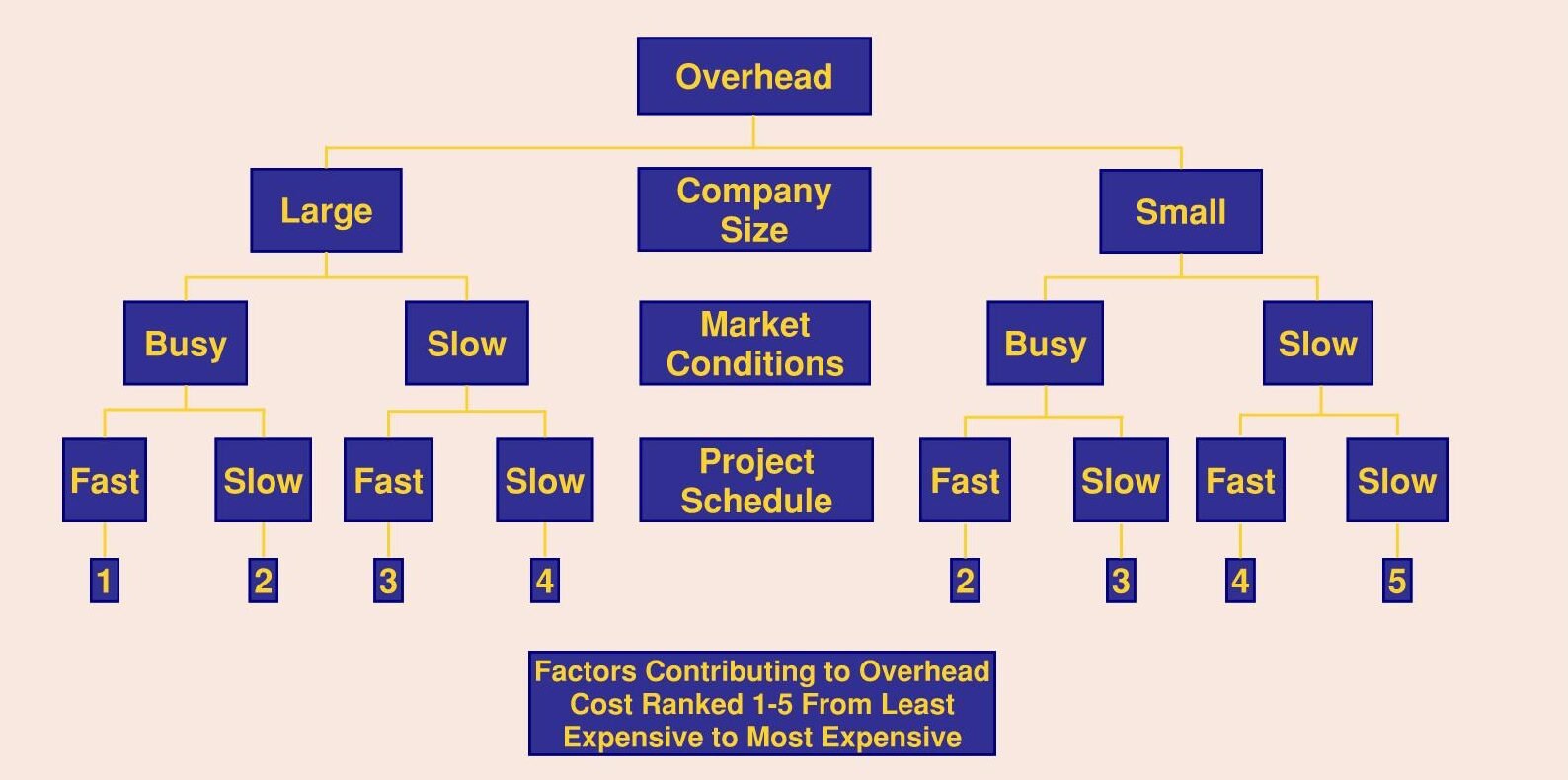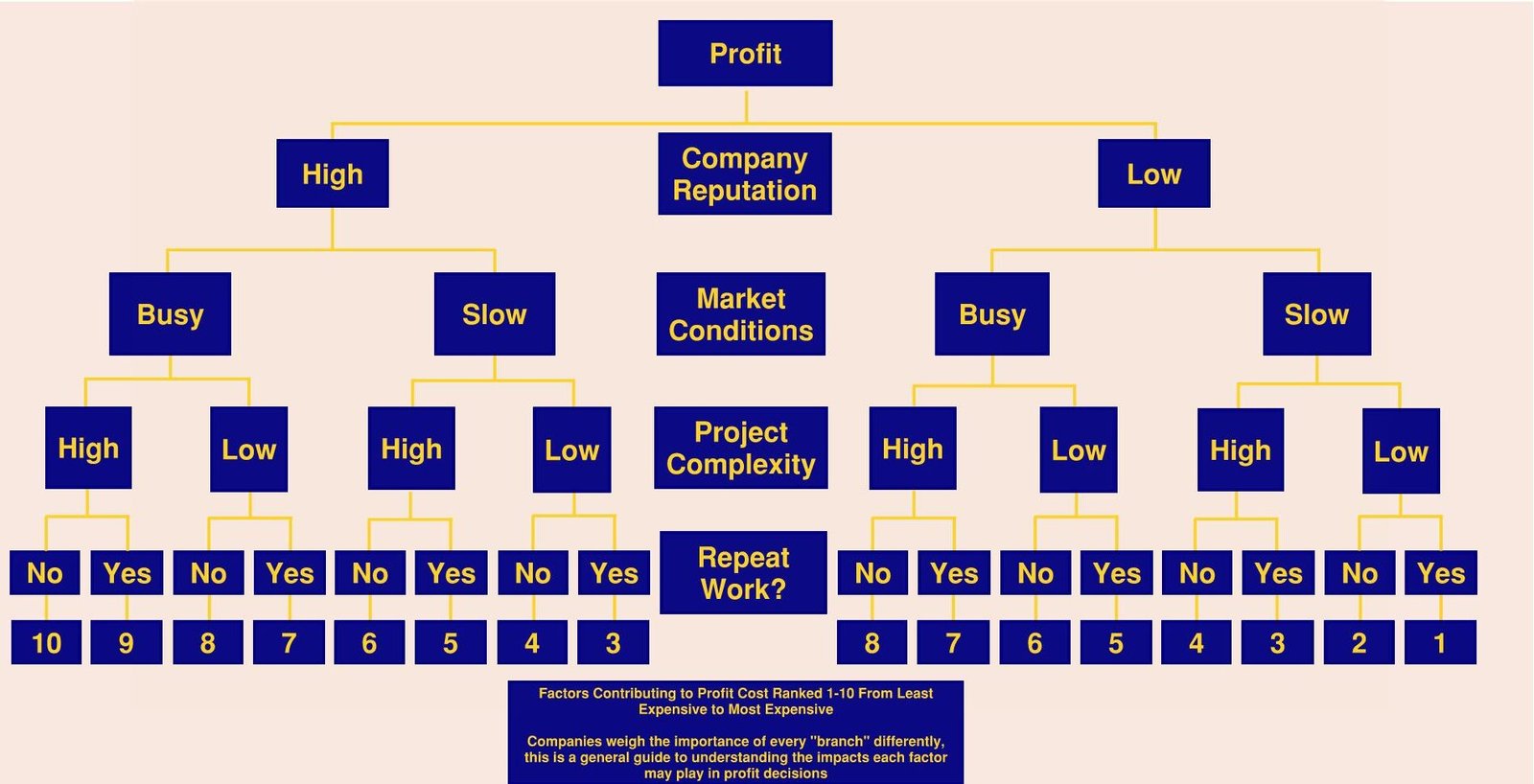Most subcontractors charge 10-50% fees on top of costs. However, when contractors say 35% fee, a portion of that is actually overhead while the rest is profit. A contractor will charge overhead and fee based on the size of their company, their strategy, current market conditions, project complexity, and more.
Table of Contents
- What factors impact profit percentage for contractors?
- Does the Size of Contractor Matter?
- How Does Contractor Reputation impact cost?
- Contractor Client Strategy Impact on Cost
- How do Market Conditions affect fees?
- Why Project Complexity Impact Cost?
- Does Schedule Impact Cost in Construction?
- Overall Impacts
What factors impact profit percentage for contractors?
Many smaller contractors may look at a project and throw out numbers such as 20% fee or 35% fee, but is it all in profit? Most likely not. For example, Try Tool Box says a general rule of thumb is the 10-10 rule. In this rule contractors markup the project 10% for overhead costs and 10% for fee.
Many contractors use this rule as a baseline, however their decisions are often based on a lot more. We will dive into how each of the following factors impact the price paid for construction:
- Size of Contractor
- Contractor Strategy
- Contractor Reputation
- Market Conditions
- Project Complexity/Risk
- Project Timeline
Does the Size of Contractor Matter?
The larger the company, the more marketing, accounting, lawyers, insurance, and estimating they have to pay for. As a result, their overhead cost is higher. Additionally, larger builders often have more streamlined processes for tracking financials and ensuring the project is built well. This results in higher overhead costs as well. That being said, the more projects they have the easier it is to disburse that cost across all of their jobs.
Estes Builders notes that overhead costs rise on a per project basis when contractors are building fewer houses at a time. They argue this is why larger companies will often have lower overhead cost. This is why market conditions play a factor in overhead and fee percentages.
Alternatively, a smaller contractor will have less staff and less overhead. However, if the market is slow, similar to the larger groups, their overhead will be harder to spread across their projects, thereby increasing their overhead on a per project basis.
How Does Contractor Reputation impact cost?
Larger groups often, though not always, will have higher reputations and are in higher demand. As a result, they will increase their fee percentage to ensure they get their desired profit on each project they win.
On the other hand, smaller contractors who are trying to grow might have lower fees to win more work and keep their people busy and employed.
Contractor Client Strategy Impact on Cost
Who You Are Might Impact What You Pay
Will an individual pay more for a house than an investor/production builder would for that same house? The answer is likely yes. When a contractor knows their client will likely provide more work in the future, they will charge lower fees with the hopes of winning future work.
Why Your General Contractor Can Impact The Fees The Subcontractors Charge.
Similarly, if a subcontractor wants to do more work with your general contractor, they may charge lower fees. This can happen for several reasons:
- General contractors who have better reputations can provide the subcontractor future work
- Subcontractor might be familiar with the general contractor, knows their processes, and knows the general contractor will not penny pinch them
Quality of Work and Cost of Builder
Similar to how owner type matters, the quality of work a contractor produces will also impact fees. For instance, production builders will likely hire higher production subcontractors whose focus is on quantity over quality. For this reason, production builders will have lower fees to guarantee work and a higher quantity of work. Alternatively, custom builders will be doing fewer jobs at a higher quality and charge a higher fee.
How do Market Conditions affect fees?
The market has a direct correlation with how contractors bid work. NAHB, the National Association of Home Builders, notes that as interest rates rise, construction slows. Hammr discusses how when a recession is coming, builders will often try to attach themselves to clients who can offer repeat work, this results in lower fees for those clients and higher fees for owners who cannot provide that guarantee.
However, as the interest rates drop, and more work becomes available, often more builders will flood an area, resulting in lower fees, from the more desperate, newer builders. On the other hand, more established builders with better reputations will charge higher fees to ensure they are winning the projects that pay best.

Why Project Complexity Impact Cost?
Project complexity means more risk for the builders. This generally results in contractors charging more in fees. Contractors evaluate complexity by location, age of building, site conditions, phasing, materials required/requested, and more. Renovation projects have more unknowns than a new build. This is one reason renovation projects often have higher fees than new builds.
Additionally, complex projects will often result in longer schedules, and schedule has an impact on fee, as discussed below.
Does Schedule Impact Cost in Construction?
Schedule will impact cost for numerous factors, such as profit on labor.
Contractors will evaluate profit on labor by using an equation used to determine if the time and resources a project takes produces a high yield of profit. For example, If a project takes 1 month and the labor costs $20,000 and a contractor makes $10,000 profit, their profit on labor would be 50%. Alternatively, if a company can find a project that costs $5,000 on labor with a $5,000 profit, their profit on labor would be 100%.
When an owner does not required a tight schedule, builders can spread out personnel on several projects. This will result in contractors charging a lower profit on labor (per job), but yield a higher return than if those resources were tied to a single job. For this reason, builders may charge lower fees on projects with longer schedules than shorter schedules.

Overall Impacts
Every builder has different goals and will prioritize each of these variables differently. It’s important to ask yourself each of the following questions:
- Who is the owner?
- What does the owner prioritize?
- Who is the general contractor? (Good Reputation? For What?)
- What is the project? (Evaluate Risk)
- What are the schedule requirements?
- Where are interest rates?
- Where is the project located?
Disclaimer
Clear Construction estimates does not take responsibility for pricing or fees calculated in this post being representative of your local market. You should do your owner research for your area. We have written this to provide a general understanding of how to estimate. The pricing and topics we have provided are indented to serve as guide. We have no sponsors or affiliation with the links provided.
Comment and Share!
If you found our content helpful, leave a comment or share with a friend! We provide estimates and estimate reviews to owners looking for verification of pricing they’ve received and to builders and trades who are bidding work. If you’re interested in us reviewing your estimates or providing an estimate, go to our services page for a quote today. We hope this was helpful, thanks for reading!
Great Post!
Great thoughts. Thanks for the tips.

Leave a Reply